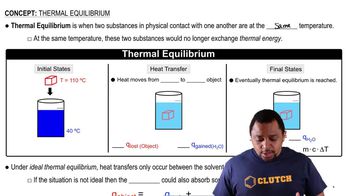Thermal Equilibrium definitions Flashcards
 Back
BackThermal Equilibrium definitions
1/12
Terms in this set (12)
- Thermal EquilibriumA state where two substances in contact reach the same temperature, ceasing thermal energy exchange.
- First Law of ThermodynamicsA principle stating energy cannot be created or destroyed, only transferred or converted.
- Heat TransferThe movement of thermal energy from a hotter object to a colder one until equilibrium is reached.
- CalorimeterA device used to measure the amount of heat absorbed or released during a chemical or physical process.
- Specific Heat CapacityThe amount of heat required to change a substance's temperature by one degree per unit mass.
- MassA measure of the amount of matter in an object, influencing its heat capacity.
- TemperatureA measure of the average kinetic energy of particles in a substance, determining heat flow direction.
- Negative QRepresents heat loss from a hotter object during thermal energy exchange.
- Positive QRepresents heat gain by a colder object during thermal energy exchange.
- Non-Ideal ConditionsScenarios where additional heat is absorbed by the calorimeter, affecting heat transfer calculations.
- Energy TransferThe process of energy moving from one system or object to another, often as heat.
- Thermal BalanceThe state achieved when all parts of a system reach the same temperature, stopping heat flow.


